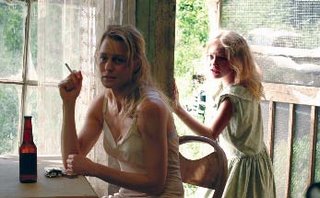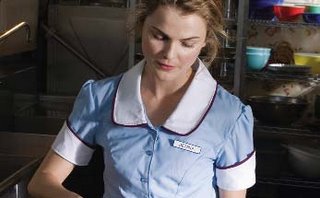Saturday, February 03, 2007
Sundance 07: Lilli Carre and the Filmmaker Pecking Order

Some Sundance filmmakers, like Brett Morgen, whose opening-night documentary “Chicago 10,” about the anti-war protests surrounding the 1968 Democratic Party Convention in Chicago, took part in an opening day press conference with Sundance founder Robert Redford. The spotlight was bright and lasting, granting Morgen a level of awareness other filmmakers lacked.
“Chuck & Buck” and “Good Girl” screenwriter Mike White returned to Sundance for his directing debut, the ensemble comedy “Year of the Dog.” His experience was relatively chaos free, complete with a pre-screening dinner party where reporters were invited to chat with White and his cast as long as tape recorders were turned off.
Rory Kennedy, longtime documentary filmmaker and social activist, took part in the traditional Sundance treadmill on behalf of her film “Ghosts of Abu Ghraib,” zipping from screenings to panels and countless interviews throughout Park City, Utah. Still, she enjoyed numerous comforts, including a car service, to make the hectic schedule a lot more tolerable.
My favorite Sundance meet involved filmmaker Lilli Carre, in town in support of her short film “How She Slept at Night” (pictured above). It was late on opening weekend and I was searching for a Wi-Fi signal at festival headquarters. Carre was in need of a place to nap and the hallway couches outside the press office doors worked perfectly for her.
Deadlines kept me from talking much with Carre and her partner before they left to attend a screening. Still, in the few minutes we shared, we discussed the Sundance topic of choice: what movies have you watched; what did you like and what did you hate?
It seemed that Carre was left to fend for herself at Sundance without dinner parties, car services, gift houses or any of the festival pizzazz. She was proof of the cruel truth of pecking orders and the low food chain status of a shorts filmmaker.
On a brighter note, our meet was that rare Sundance moment, a non-scheduled, sponsor-free, completely casual get-together. Lilli Carre was simply looking for a place to snooze but our chance meeting brought back memories of Sundance at its laidback best.
Friday, February 02, 2007
Sundance 07: No Escaping the ‘Hounddog'

The main press-screening venue at Sundance, the locale for many films in dramatic competition, is a Yarrow Hotel ballroom converted into a cinema via office chairs on risers, a temporary screen and a four-walled projector. The location is dead-on convenient; smack in the middle of Park City, just across the parking lot from the main supermarket.
In terms of a quality viewing experience, the Yarrow 1 is roughhewn at best (Its down-the-hall counterpart, the Yarrow 2 is the same set up only smaller).
When crowded, it’s hard to get up and leave due to plastic fencing along both edges. It’s a fact worth remembering when measuring the disastrous press reception to Deborah Kampmeier’s overboard, Southern gothic “Hounddog.”
I’m not going to go into detail about my reasons for disliking “Hounddog,” the story of Lewellen (Dakota Fanning), a young girl in 1950s rural Alabama who lives something of a miserable life with her lecherous father (David Morse) and bible-thumping granny (Piper Laurie). For that, you can read my “indieWire” review at www.indiewire.com. What I want to focus on via my blog is the painful efforts critics made in order to leave the “Hounddog” screening early. For me, that speaks volumes about Kampmeier’s disastrous film.
“Hounddog” may only be 98 minutes in length but many audience members decided by its midway point that they had watched enough. There were plenty of choices for fed-up moments: lightning striking Lewellen’s daddy, her granny waving a shotgun or an army of snakes slithering through her window.
Sitting alongside James Mottram, covering Sundance for UK’s “Independent” newspaper, I watched numerous people attempt to climb over the fence in order to get out of the screening. There wasn’t much time left to the movie but that didn’t matter. They just had to get out, even if that meant falling over the fence and landing on their ass.
“There’s no escaping the “Hounddog!”” I yelled to the escaping critics. Sure, they avoided watching more of “Hounddog” but the memory of the film has stuck to them like the stink of road kill on a hot summer drive. That's something we all shared, early exits or not.
Wednesday, January 31, 2007
Sundance 07: “B” also stands for bad behavior when actor withdraws support for Sundance hit “Waitress”

One of my favorite Sundance gossip stories involves a Canadian friend and colleague involved in the festival’s shortest press interview.
My reporter friend sat down to interview a fellow Canadian, Nathan Fillion, who was at the festival to support his lead role in “Waitress,” an audience-friendly drama about an unhappily married waitress (Keri Russell; pictured above) who experiences a shot at a happier life via a relationship with the new town doctor (Fillion).
Fillion’s publicity work was extra important because the director of “Waitress,” veteran New York actress Adrienne Shelly, was tragically murdered in November. Feeling ill due to her pregnancy, Keri Russell bowed out of many of her press commitments. It was up to Fillion to stand right by Shelly and work at spreading the word on her film. Instead, after recognizing his interviewer’s name, he went on a tirade regarding his earlier film work, the sci-fi adventure “Serenity” and the monster movie “Slither.”
“Now I know why you didn’t introduce yourself,” Fillion snarled at the surprised reporter. “Do you know you’re the only critic who didn’t like “Serenity”?”
Fillion was referring to the critic’s negative “Serenity” review, which ran in his hometown paper in Edmonton, Alberta, in front of his parents, no less.
Any attempts to flip to the topic of “Waitress” was lost when Fillion got up and left. Clearly, his ego took priority over his obligation to Shelly and her movie.
The good news is that Fox Searchlight bought “Waitress” at Sundance and plans to release the film in late 2007. This means Fillion will have another chance at promoting the film and acting right. My Canadian friend would probably be willing to sit down again for a second-try interview. After all, she’s a professional.
Tuesday, January 30, 2007
Sundance 07: Old-Time Park City Means Bar Talk with David Gordon Green and Friends

Late into Sundance, I asked veteran actor Aidan Quinn, in town to support his performance in the enthralling drama "Dark Matter," about a Chinese graduate student who sinks into despair, if the fun and casual comradery of past festivals were gone. He answered with a definite "Yes."
Speaking a day earlier, Picturehouse President Bob Berney agreed, although with the qualification that Sundance was still one of the best things about the independent film business.
Still, for those publicists and buyers, directors and reporters, festival programmers and actors who have enough Sundances under their belts to make comparisons (Sundance 07 was my 14th festival as a journalist), it's difficult not to wax nostalgic.
A burst of old-time Sundance emerged on the festival's second Friday, during an interview with "Snow Angels" director David Gordon Green at one of Park City's more casual bars. Once the tape recorder was turned off and a talk about "Snow Angels" (pictured above) ended, the drinks kept flowing and cigarettes were lit. Craig Zobel, director of the Sundance entry "The Great World of Sound" and a longtime friend of Green's joined the chat (Green is also a producer on his film). Soon, other members of their North Carolina posse gathered around the bar.
Topics shared included festival gossip and guesswork involving closing-night awards. But the majority of the conversation focused on all types of movies, whether loved or loathed.
Two promises were made at the bar. One was to watch Zobel's much-acclaimed "Great World of Sound" on disc soon after returning home and to let him know my thoughts. The other was to fulfill a back-home-from-Sundance tradition and go watch some Hollywood fare as a counter-balance to all the edgy festival films. We agreed on Joe Carnahan's gangster movie "Smokin' Aces" and hoped it would be closer in spirit to "Narc" and less like his sloppy debut "Blood, Guts, Bullets and Octane."
Left unsaid was a third promise, the most important of all.
If the group of us are together at a future Sundance, we end the festival at the same local bar with more drinks and smokes.
Monday, January 29, 2007
Sundance 07: 'Zoo' Wows Shuttle Driver

The drive between Park City, Utah and the Salt Lake City Airport takes thirty minutes depending on weather conditions and the number of passenger pick-ups. Exiting Sundance is always a test in patience thanks to overflowing shuttle vans. One way of coping with the return trip is to debate festival films with the fellow passengers. When the crowd is a mix between festival attendees and skiers who happened to catch some movies, the conversations turn livelier.
Most everyone in my van this festival agreed that the Dakota Fanning drama "Hounddog" was awful and that Marla Olmstead, the young girl painter in the documentary "My Kid Could Paint That," did receive help from her father.
The Sundance film that generated the most interest from the shuttle driver was Robinson Devor's (pictured above) documentary "Zoo," about a group of men who have sex with horses. One, he couldn't believe anything like that happens. Two, he wondered who would make a movie like "Zoo" and who would watch it?
Told that "Zoo" was more artful than graphic, the driver settled down. Still, it's worth noting that of all the films discussed, "Zoo" was the one he kept discussing. Personally, I considered his outbursts a good sign for "Zoo."
Sunday, January 28, 2007
Sundance 07: Musings in Rewind

A general rule of thumb that I like to tell friends is that journalists blog between deadlines. To readers of “Flyover Online,” I would like to point out that numerous daily deadlines kept me from blogging throughout this year’s Sundance Film Festival.
This morning, an ice cold Sunday, the various filmmaker victors and might-haves put the Saturday night Awards Ceremony behind them and head to the Salt Lake City Airport.
With every deadline completed, I can finally exhale and comment on Sundance 2007.
In past years, I have scratched my head over jury prizewinners but this time the jurors and I are completely in-sync.
“Manda Bala” (Send a Bullet), director Jason Kohn’s stunning and fascinating omnibus film about the culture of crime in Brazil, won the Documentary Grand Jury Prize.
The drama I praised the most, director Chris Zalla’s Mexican immigrant drama “Padre Nuestro,” won the Dramatic Grand Jury Prize.
Now, I could say something silly about the jurors being influenced by my “indieWire” reviews but I’ll leave that for my overly proud mother. I’m just happy for the two deserving filmmakers.
As far as more musings on the busy and colorful festival, I promise to post my hindsight commentary regularly, or at least between gulps of cold medicine. Not everybody leaves Sundance with a trophy, or even gift house goodies, but almost everyone I know has a cold.